Organisational Behaviour Report: Unilever's Influence on Employees
VerifiedAdded on 2023/01/11
|14
|4521
|30
Report
AI Summary
This report provides an analysis of organisational behaviour within Unilever, a global FMCG company. It examines how organizational culture, politics, and power influence individual and team behaviour and performance. The report further evaluates content and process theories of motivation and motivational techniques to achieve goals. Additionally, it discusses the characteristics of effective and ineffective teams. Finally, the report applies organizational behaviour concepts and philosophies to a given business situation within Unilever, assessing their impact on employee performance and overall organizational success. The report covers Handy's model of organisational culture, various forms of power, content and process theories of motivation including Maslow's hierarchy, and the importance of both intrinsic and extrinsic motivation. The analysis emphasizes how these elements contribute to Unilever's operations and employee management.
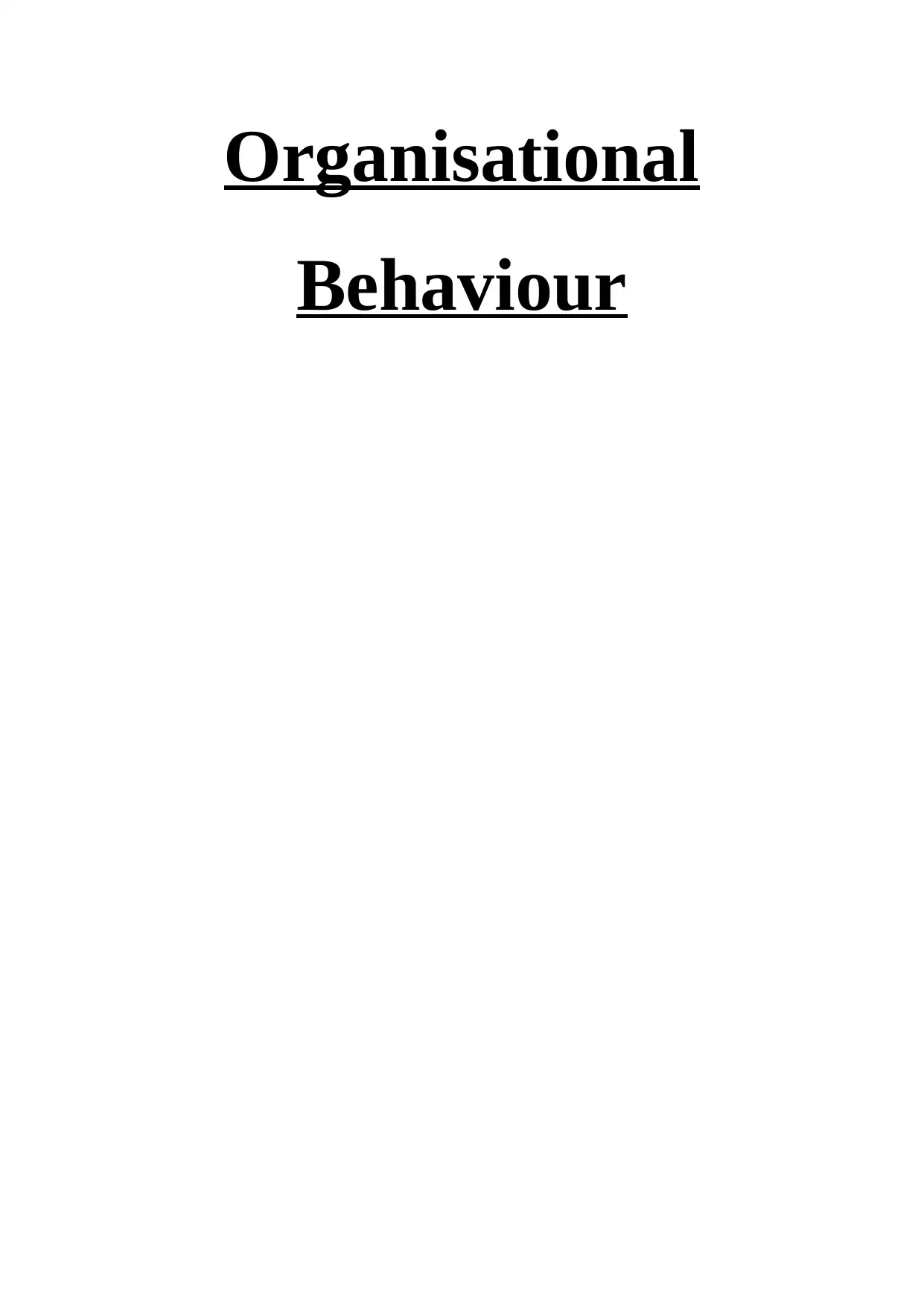
Organisational
Behaviour
Behaviour
Paraphrase This Document
Need a fresh take? Get an instant paraphrase of this document with our AI Paraphraser
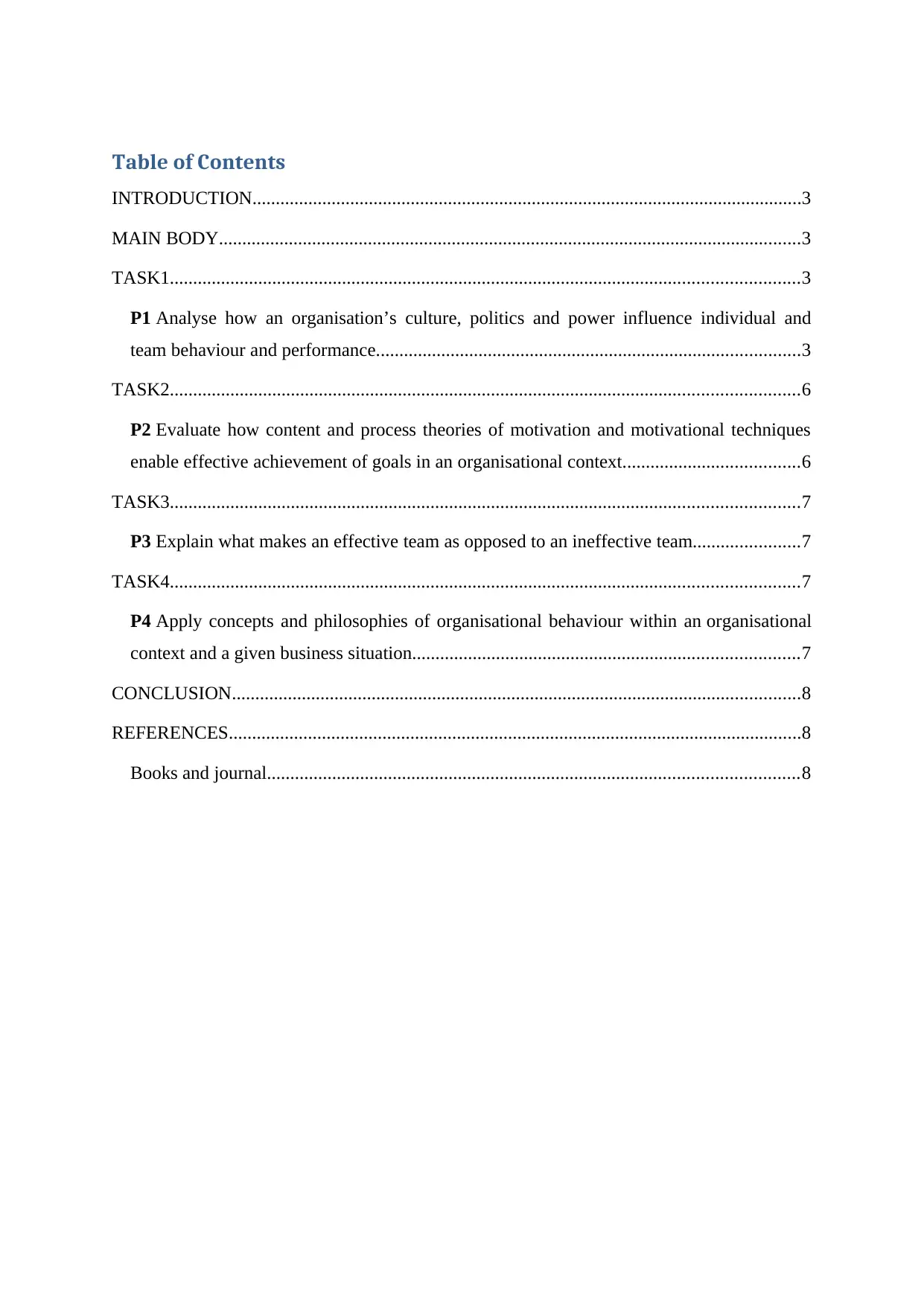
Table of Contents
INTRODUCTION......................................................................................................................3
MAIN BODY.............................................................................................................................3
TASK1.......................................................................................................................................3
P1 Analyse how an organisation’s culture, politics and power influence individual and
team behaviour and performance...........................................................................................3
TASK2.......................................................................................................................................6
P2 Evaluate how content and process theories of motivation and motivational techniques
enable effective achievement of goals in an organisational context......................................6
TASK3.......................................................................................................................................7
P3 Explain what makes an effective team as opposed to an ineffective team.......................7
TASK4.......................................................................................................................................7
P4 Apply concepts and philosophies of organisational behaviour within an organisational
context and a given business situation...................................................................................7
CONCLUSION..........................................................................................................................8
REFERENCES...........................................................................................................................8
Books and journal..................................................................................................................8
INTRODUCTION......................................................................................................................3
MAIN BODY.............................................................................................................................3
TASK1.......................................................................................................................................3
P1 Analyse how an organisation’s culture, politics and power influence individual and
team behaviour and performance...........................................................................................3
TASK2.......................................................................................................................................6
P2 Evaluate how content and process theories of motivation and motivational techniques
enable effective achievement of goals in an organisational context......................................6
TASK3.......................................................................................................................................7
P3 Explain what makes an effective team as opposed to an ineffective team.......................7
TASK4.......................................................................................................................................7
P4 Apply concepts and philosophies of organisational behaviour within an organisational
context and a given business situation...................................................................................7
CONCLUSION..........................................................................................................................8
REFERENCES...........................................................................................................................8
Books and journal..................................................................................................................8
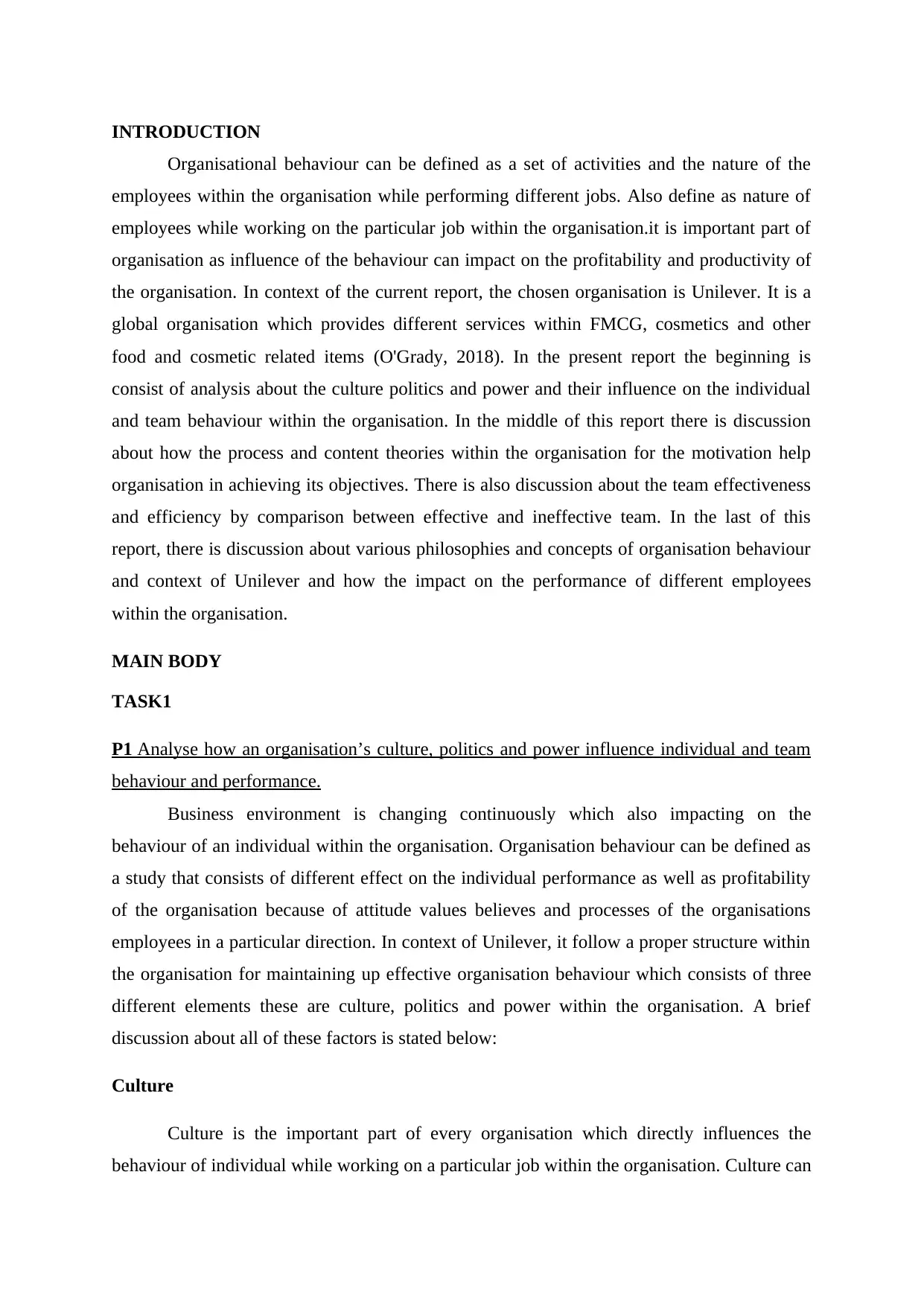
INTRODUCTION
Organisational behaviour can be defined as a set of activities and the nature of the
employees within the organisation while performing different jobs. Also define as nature of
employees while working on the particular job within the organisation.it is important part of
organisation as influence of the behaviour can impact on the profitability and productivity of
the organisation. In context of the current report, the chosen organisation is Unilever. It is a
global organisation which provides different services within FMCG, cosmetics and other
food and cosmetic related items (O'Grady, 2018). In the present report the beginning is
consist of analysis about the culture politics and power and their influence on the individual
and team behaviour within the organisation. In the middle of this report there is discussion
about how the process and content theories within the organisation for the motivation help
organisation in achieving its objectives. There is also discussion about the team effectiveness
and efficiency by comparison between effective and ineffective team. In the last of this
report, there is discussion about various philosophies and concepts of organisation behaviour
and context of Unilever and how the impact on the performance of different employees
within the organisation.
MAIN BODY
TASK1
P1 Analyse how an organisation’s culture, politics and power influence individual and team
behaviour and performance.
Business environment is changing continuously which also impacting on the
behaviour of an individual within the organisation. Organisation behaviour can be defined as
a study that consists of different effect on the individual performance as well as profitability
of the organisation because of attitude values believes and processes of the organisations
employees in a particular direction. In context of Unilever, it follow a proper structure within
the organisation for maintaining up effective organisation behaviour which consists of three
different elements these are culture, politics and power within the organisation. A brief
discussion about all of these factors is stated below:
Culture
Culture is the important part of every organisation which directly influences the
behaviour of individual while working on a particular job within the organisation. Culture can
Organisational behaviour can be defined as a set of activities and the nature of the
employees within the organisation while performing different jobs. Also define as nature of
employees while working on the particular job within the organisation.it is important part of
organisation as influence of the behaviour can impact on the profitability and productivity of
the organisation. In context of the current report, the chosen organisation is Unilever. It is a
global organisation which provides different services within FMCG, cosmetics and other
food and cosmetic related items (O'Grady, 2018). In the present report the beginning is
consist of analysis about the culture politics and power and their influence on the individual
and team behaviour within the organisation. In the middle of this report there is discussion
about how the process and content theories within the organisation for the motivation help
organisation in achieving its objectives. There is also discussion about the team effectiveness
and efficiency by comparison between effective and ineffective team. In the last of this
report, there is discussion about various philosophies and concepts of organisation behaviour
and context of Unilever and how the impact on the performance of different employees
within the organisation.
MAIN BODY
TASK1
P1 Analyse how an organisation’s culture, politics and power influence individual and team
behaviour and performance.
Business environment is changing continuously which also impacting on the
behaviour of an individual within the organisation. Organisation behaviour can be defined as
a study that consists of different effect on the individual performance as well as profitability
of the organisation because of attitude values believes and processes of the organisations
employees in a particular direction. In context of Unilever, it follow a proper structure within
the organisation for maintaining up effective organisation behaviour which consists of three
different elements these are culture, politics and power within the organisation. A brief
discussion about all of these factors is stated below:
Culture
Culture is the important part of every organisation which directly influences the
behaviour of individual while working on a particular job within the organisation. Culture can
⊘ This is a preview!⊘
Do you want full access?
Subscribe today to unlock all pages.

Trusted by 1+ million students worldwide
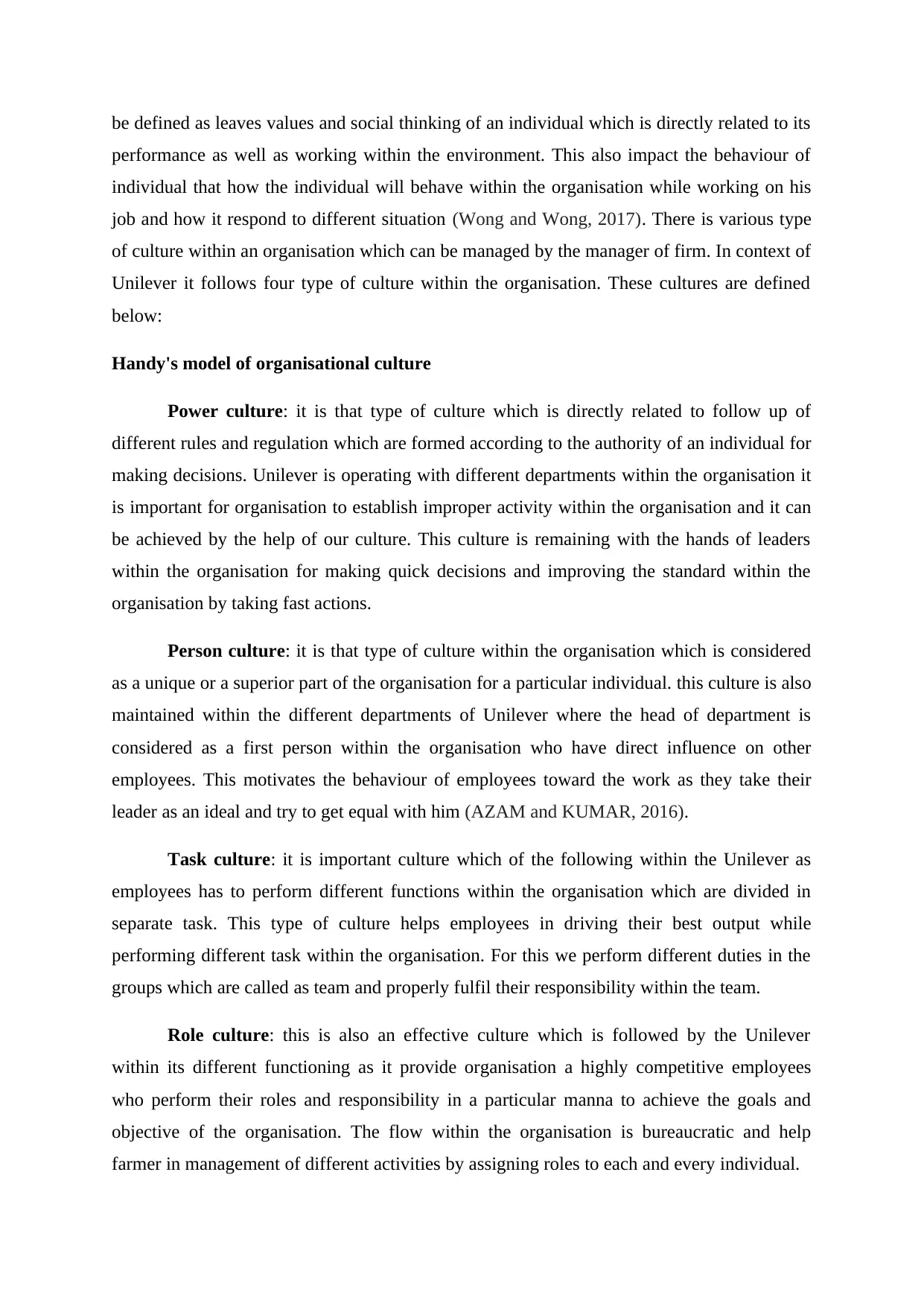
be defined as leaves values and social thinking of an individual which is directly related to its
performance as well as working within the environment. This also impact the behaviour of
individual that how the individual will behave within the organisation while working on his
job and how it respond to different situation (Wong and Wong, 2017). There is various type
of culture within an organisation which can be managed by the manager of firm. In context of
Unilever it follows four type of culture within the organisation. These cultures are defined
below:
Handy's model of organisational culture
Power culture: it is that type of culture which is directly related to follow up of
different rules and regulation which are formed according to the authority of an individual for
making decisions. Unilever is operating with different departments within the organisation it
is important for organisation to establish improper activity within the organisation and it can
be achieved by the help of our culture. This culture is remaining with the hands of leaders
within the organisation for making quick decisions and improving the standard within the
organisation by taking fast actions.
Person culture: it is that type of culture within the organisation which is considered
as a unique or a superior part of the organisation for a particular individual. this culture is also
maintained within the different departments of Unilever where the head of department is
considered as a first person within the organisation who have direct influence on other
employees. This motivates the behaviour of employees toward the work as they take their
leader as an ideal and try to get equal with him (AZAM and KUMAR, 2016).
Task culture: it is important culture which of the following within the Unilever as
employees has to perform different functions within the organisation which are divided in
separate task. This type of culture helps employees in driving their best output while
performing different task within the organisation. For this we perform different duties in the
groups which are called as team and properly fulfil their responsibility within the team.
Role culture: this is also an effective culture which is followed by the Unilever
within its different functioning as it provide organisation a highly competitive employees
who perform their roles and responsibility in a particular manna to achieve the goals and
objective of the organisation. The flow within the organisation is bureaucratic and help
farmer in management of different activities by assigning roles to each and every individual.
performance as well as working within the environment. This also impact the behaviour of
individual that how the individual will behave within the organisation while working on his
job and how it respond to different situation (Wong and Wong, 2017). There is various type
of culture within an organisation which can be managed by the manager of firm. In context of
Unilever it follows four type of culture within the organisation. These cultures are defined
below:
Handy's model of organisational culture
Power culture: it is that type of culture which is directly related to follow up of
different rules and regulation which are formed according to the authority of an individual for
making decisions. Unilever is operating with different departments within the organisation it
is important for organisation to establish improper activity within the organisation and it can
be achieved by the help of our culture. This culture is remaining with the hands of leaders
within the organisation for making quick decisions and improving the standard within the
organisation by taking fast actions.
Person culture: it is that type of culture within the organisation which is considered
as a unique or a superior part of the organisation for a particular individual. this culture is also
maintained within the different departments of Unilever where the head of department is
considered as a first person within the organisation who have direct influence on other
employees. This motivates the behaviour of employees toward the work as they take their
leader as an ideal and try to get equal with him (AZAM and KUMAR, 2016).
Task culture: it is important culture which of the following within the Unilever as
employees has to perform different functions within the organisation which are divided in
separate task. This type of culture helps employees in driving their best output while
performing different task within the organisation. For this we perform different duties in the
groups which are called as team and properly fulfil their responsibility within the team.
Role culture: this is also an effective culture which is followed by the Unilever
within its different functioning as it provide organisation a highly competitive employees
who perform their roles and responsibility in a particular manna to achieve the goals and
objective of the organisation. The flow within the organisation is bureaucratic and help
farmer in management of different activities by assigning roles to each and every individual.
Paraphrase This Document
Need a fresh take? Get an instant paraphrase of this document with our AI Paraphraser
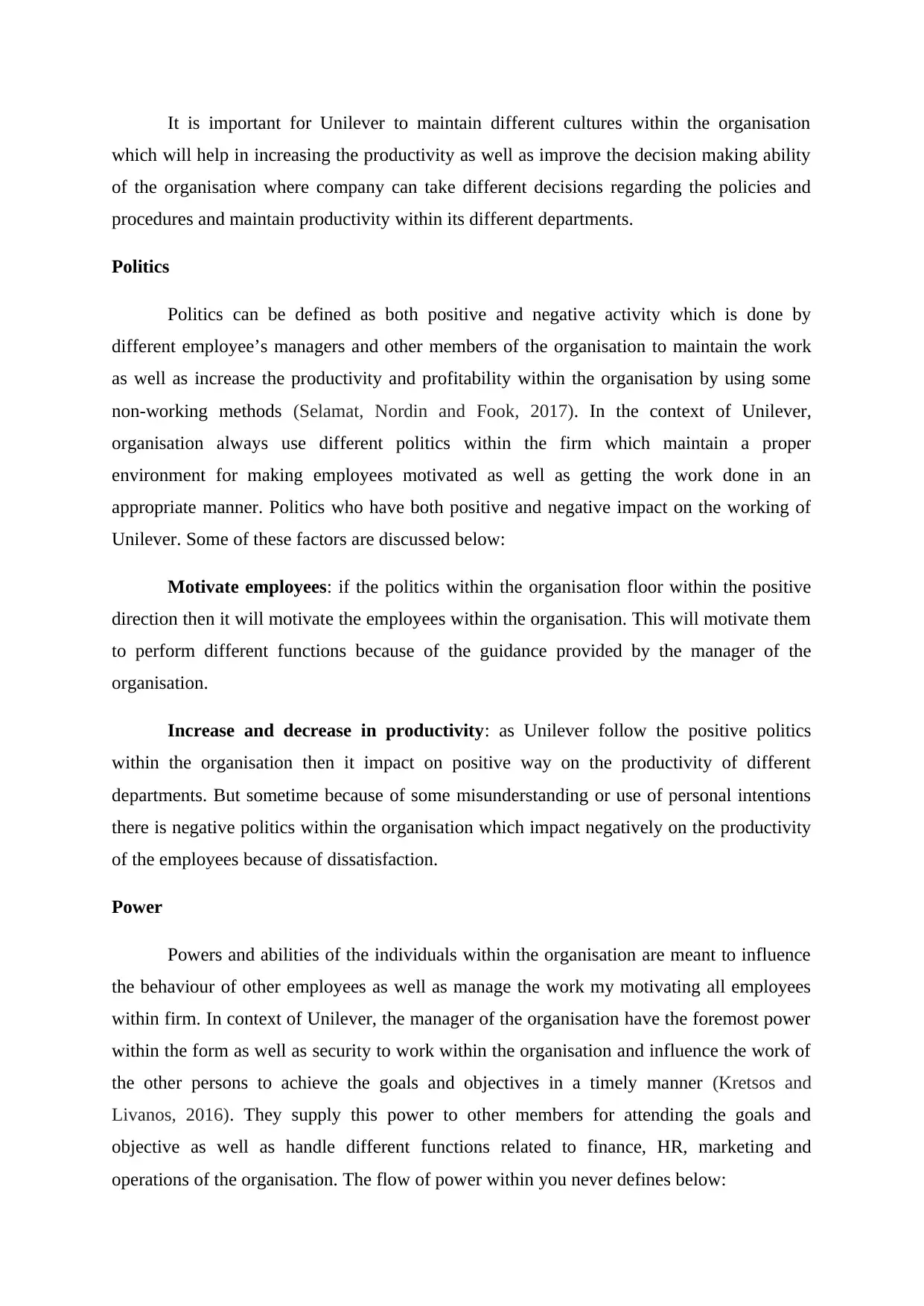
It is important for Unilever to maintain different cultures within the organisation
which will help in increasing the productivity as well as improve the decision making ability
of the organisation where company can take different decisions regarding the policies and
procedures and maintain productivity within its different departments.
Politics
Politics can be defined as both positive and negative activity which is done by
different employee’s managers and other members of the organisation to maintain the work
as well as increase the productivity and profitability within the organisation by using some
non-working methods (Selamat, Nordin and Fook, 2017). In the context of Unilever,
organisation always use different politics within the firm which maintain a proper
environment for making employees motivated as well as getting the work done in an
appropriate manner. Politics who have both positive and negative impact on the working of
Unilever. Some of these factors are discussed below:
Motivate employees: if the politics within the organisation floor within the positive
direction then it will motivate the employees within the organisation. This will motivate them
to perform different functions because of the guidance provided by the manager of the
organisation.
Increase and decrease in productivity: as Unilever follow the positive politics
within the organisation then it impact on positive way on the productivity of different
departments. But sometime because of some misunderstanding or use of personal intentions
there is negative politics within the organisation which impact negatively on the productivity
of the employees because of dissatisfaction.
Power
Powers and abilities of the individuals within the organisation are meant to influence
the behaviour of other employees as well as manage the work my motivating all employees
within firm. In context of Unilever, the manager of the organisation have the foremost power
within the form as well as security to work within the organisation and influence the work of
the other persons to achieve the goals and objectives in a timely manner (Kretsos and
Livanos, 2016). They supply this power to other members for attending the goals and
objective as well as handle different functions related to finance, HR, marketing and
operations of the organisation. The flow of power within you never defines below:
which will help in increasing the productivity as well as improve the decision making ability
of the organisation where company can take different decisions regarding the policies and
procedures and maintain productivity within its different departments.
Politics
Politics can be defined as both positive and negative activity which is done by
different employee’s managers and other members of the organisation to maintain the work
as well as increase the productivity and profitability within the organisation by using some
non-working methods (Selamat, Nordin and Fook, 2017). In the context of Unilever,
organisation always use different politics within the firm which maintain a proper
environment for making employees motivated as well as getting the work done in an
appropriate manner. Politics who have both positive and negative impact on the working of
Unilever. Some of these factors are discussed below:
Motivate employees: if the politics within the organisation floor within the positive
direction then it will motivate the employees within the organisation. This will motivate them
to perform different functions because of the guidance provided by the manager of the
organisation.
Increase and decrease in productivity: as Unilever follow the positive politics
within the organisation then it impact on positive way on the productivity of different
departments. But sometime because of some misunderstanding or use of personal intentions
there is negative politics within the organisation which impact negatively on the productivity
of the employees because of dissatisfaction.
Power
Powers and abilities of the individuals within the organisation are meant to influence
the behaviour of other employees as well as manage the work my motivating all employees
within firm. In context of Unilever, the manager of the organisation have the foremost power
within the form as well as security to work within the organisation and influence the work of
the other persons to achieve the goals and objectives in a timely manner (Kretsos and
Livanos, 2016). They supply this power to other members for attending the goals and
objective as well as handle different functions related to finance, HR, marketing and
operations of the organisation. The flow of power within you never defines below:
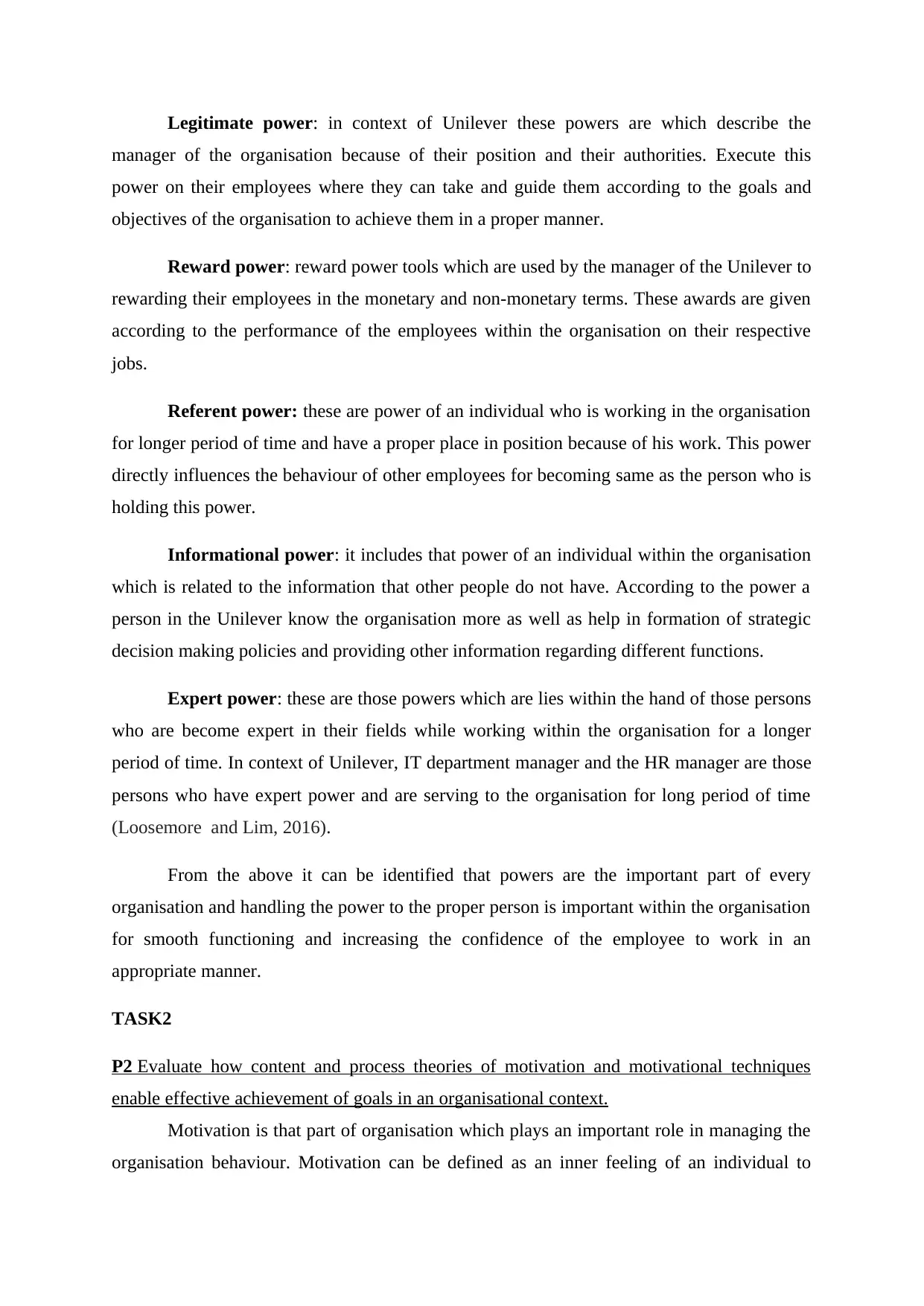
Legitimate power: in context of Unilever these powers are which describe the
manager of the organisation because of their position and their authorities. Execute this
power on their employees where they can take and guide them according to the goals and
objectives of the organisation to achieve them in a proper manner.
Reward power: reward power tools which are used by the manager of the Unilever to
rewarding their employees in the monetary and non-monetary terms. These awards are given
according to the performance of the employees within the organisation on their respective
jobs.
Referent power: these are power of an individual who is working in the organisation
for longer period of time and have a proper place in position because of his work. This power
directly influences the behaviour of other employees for becoming same as the person who is
holding this power.
Informational power: it includes that power of an individual within the organisation
which is related to the information that other people do not have. According to the power a
person in the Unilever know the organisation more as well as help in formation of strategic
decision making policies and providing other information regarding different functions.
Expert power: these are those powers which are lies within the hand of those persons
who are become expert in their fields while working within the organisation for a longer
period of time. In context of Unilever, IT department manager and the HR manager are those
persons who have expert power and are serving to the organisation for long period of time
(Loosemore and Lim, 2016).
From the above it can be identified that powers are the important part of every
organisation and handling the power to the proper person is important within the organisation
for smooth functioning and increasing the confidence of the employee to work in an
appropriate manner.
TASK2
P2 Evaluate how content and process theories of motivation and motivational techniques
enable effective achievement of goals in an organisational context.
Motivation is that part of organisation which plays an important role in managing the
organisation behaviour. Motivation can be defined as an inner feeling of an individual to
manager of the organisation because of their position and their authorities. Execute this
power on their employees where they can take and guide them according to the goals and
objectives of the organisation to achieve them in a proper manner.
Reward power: reward power tools which are used by the manager of the Unilever to
rewarding their employees in the monetary and non-monetary terms. These awards are given
according to the performance of the employees within the organisation on their respective
jobs.
Referent power: these are power of an individual who is working in the organisation
for longer period of time and have a proper place in position because of his work. This power
directly influences the behaviour of other employees for becoming same as the person who is
holding this power.
Informational power: it includes that power of an individual within the organisation
which is related to the information that other people do not have. According to the power a
person in the Unilever know the organisation more as well as help in formation of strategic
decision making policies and providing other information regarding different functions.
Expert power: these are those powers which are lies within the hand of those persons
who are become expert in their fields while working within the organisation for a longer
period of time. In context of Unilever, IT department manager and the HR manager are those
persons who have expert power and are serving to the organisation for long period of time
(Loosemore and Lim, 2016).
From the above it can be identified that powers are the important part of every
organisation and handling the power to the proper person is important within the organisation
for smooth functioning and increasing the confidence of the employee to work in an
appropriate manner.
TASK2
P2 Evaluate how content and process theories of motivation and motivational techniques
enable effective achievement of goals in an organisational context.
Motivation is that part of organisation which plays an important role in managing the
organisation behaviour. Motivation can be defined as an inner feeling of an individual to
⊘ This is a preview!⊘
Do you want full access?
Subscribe today to unlock all pages.

Trusted by 1+ million students worldwide
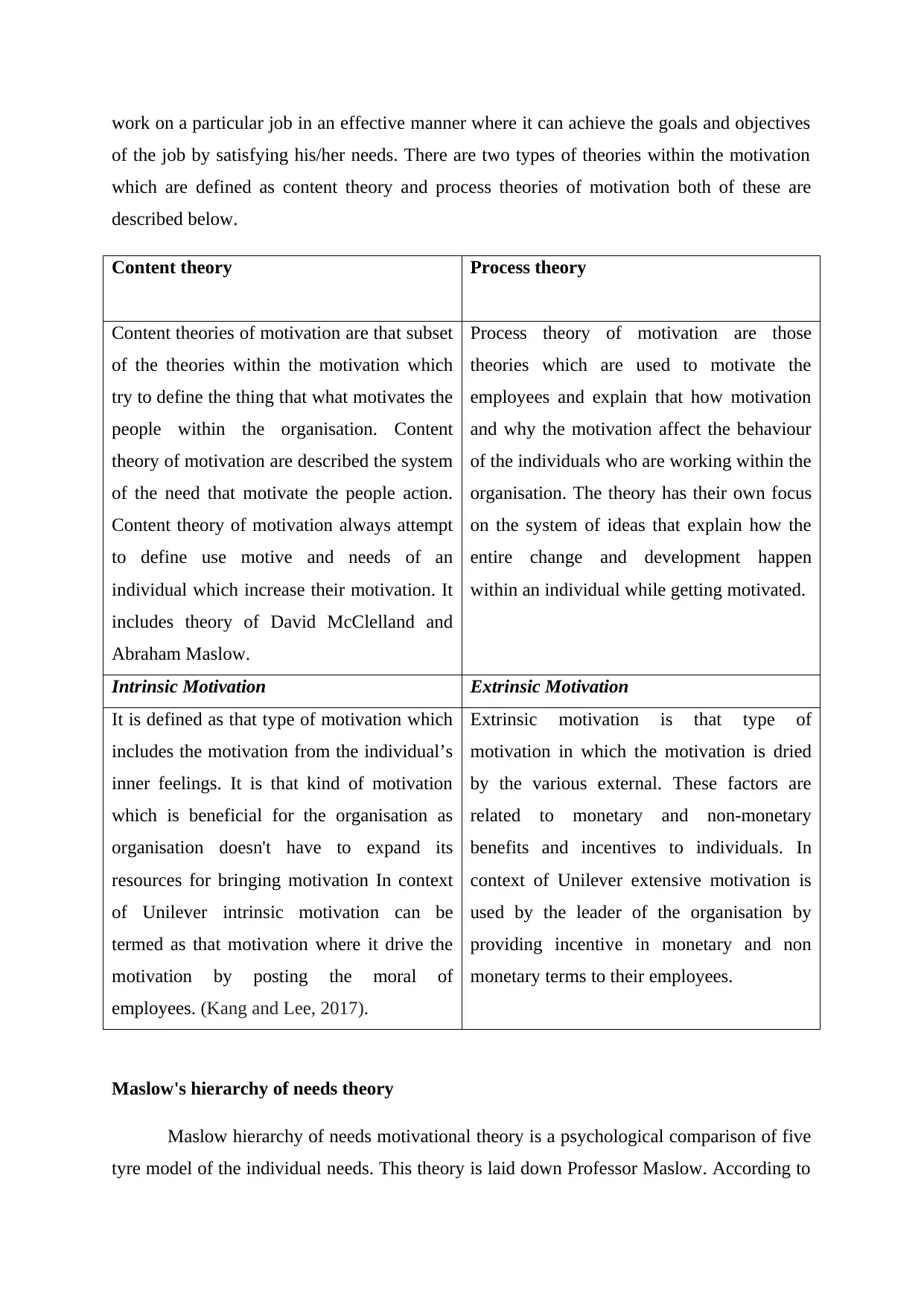
work on a particular job in an effective manner where it can achieve the goals and objectives
of the job by satisfying his/her needs. There are two types of theories within the motivation
which are defined as content theory and process theories of motivation both of these are
described below.
Content theory Process theory
Content theories of motivation are that subset
of the theories within the motivation which
try to define the thing that what motivates the
people within the organisation. Content
theory of motivation are described the system
of the need that motivate the people action.
Content theory of motivation always attempt
to define use motive and needs of an
individual which increase their motivation. It
includes theory of David McClelland and
Abraham Maslow.
Process theory of motivation are those
theories which are used to motivate the
employees and explain that how motivation
and why the motivation affect the behaviour
of the individuals who are working within the
organisation. The theory has their own focus
on the system of ideas that explain how the
entire change and development happen
within an individual while getting motivated.
Intrinsic Motivation Extrinsic Motivation
It is defined as that type of motivation which
includes the motivation from the individual’s
inner feelings. It is that kind of motivation
which is beneficial for the organisation as
organisation doesn't have to expand its
resources for bringing motivation In context
of Unilever intrinsic motivation can be
termed as that motivation where it drive the
motivation by posting the moral of
employees. (Kang and Lee, 2017).
Extrinsic motivation is that type of
motivation in which the motivation is dried
by the various external. These factors are
related to monetary and non-monetary
benefits and incentives to individuals. In
context of Unilever extensive motivation is
used by the leader of the organisation by
providing incentive in monetary and non
monetary terms to their employees.
Maslow's hierarchy of needs theory
Maslow hierarchy of needs motivational theory is a psychological comparison of five
tyre model of the individual needs. This theory is laid down Professor Maslow. According to
of the job by satisfying his/her needs. There are two types of theories within the motivation
which are defined as content theory and process theories of motivation both of these are
described below.
Content theory Process theory
Content theories of motivation are that subset
of the theories within the motivation which
try to define the thing that what motivates the
people within the organisation. Content
theory of motivation are described the system
of the need that motivate the people action.
Content theory of motivation always attempt
to define use motive and needs of an
individual which increase their motivation. It
includes theory of David McClelland and
Abraham Maslow.
Process theory of motivation are those
theories which are used to motivate the
employees and explain that how motivation
and why the motivation affect the behaviour
of the individuals who are working within the
organisation. The theory has their own focus
on the system of ideas that explain how the
entire change and development happen
within an individual while getting motivated.
Intrinsic Motivation Extrinsic Motivation
It is defined as that type of motivation which
includes the motivation from the individual’s
inner feelings. It is that kind of motivation
which is beneficial for the organisation as
organisation doesn't have to expand its
resources for bringing motivation In context
of Unilever intrinsic motivation can be
termed as that motivation where it drive the
motivation by posting the moral of
employees. (Kang and Lee, 2017).
Extrinsic motivation is that type of
motivation in which the motivation is dried
by the various external. These factors are
related to monetary and non-monetary
benefits and incentives to individuals. In
context of Unilever extensive motivation is
used by the leader of the organisation by
providing incentive in monetary and non
monetary terms to their employees.
Maslow's hierarchy of needs theory
Maslow hierarchy of needs motivational theory is a psychological comparison of five
tyre model of the individual needs. This theory is laid down Professor Maslow. According to
Paraphrase This Document
Need a fresh take? Get an instant paraphrase of this document with our AI Paraphraser
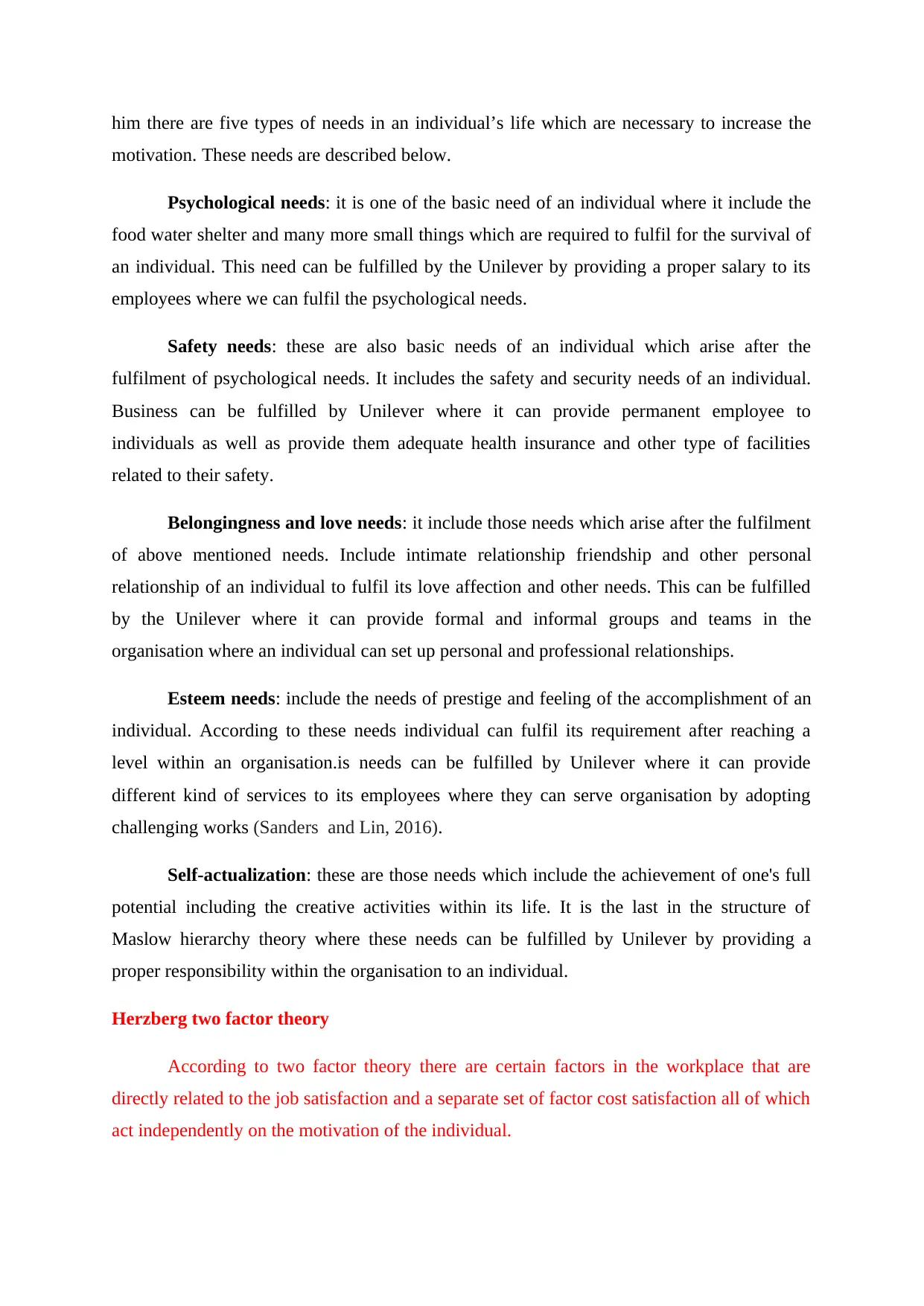
him there are five types of needs in an individual’s life which are necessary to increase the
motivation. These needs are described below.
Psychological needs: it is one of the basic need of an individual where it include the
food water shelter and many more small things which are required to fulfil for the survival of
an individual. This need can be fulfilled by the Unilever by providing a proper salary to its
employees where we can fulfil the psychological needs.
Safety needs: these are also basic needs of an individual which arise after the
fulfilment of psychological needs. It includes the safety and security needs of an individual.
Business can be fulfilled by Unilever where it can provide permanent employee to
individuals as well as provide them adequate health insurance and other type of facilities
related to their safety.
Belongingness and love needs: it include those needs which arise after the fulfilment
of above mentioned needs. Include intimate relationship friendship and other personal
relationship of an individual to fulfil its love affection and other needs. This can be fulfilled
by the Unilever where it can provide formal and informal groups and teams in the
organisation where an individual can set up personal and professional relationships.
Esteem needs: include the needs of prestige and feeling of the accomplishment of an
individual. According to these needs individual can fulfil its requirement after reaching a
level within an organisation.is needs can be fulfilled by Unilever where it can provide
different kind of services to its employees where they can serve organisation by adopting
challenging works (Sanders and Lin, 2016).
Self-actualization: these are those needs which include the achievement of one's full
potential including the creative activities within its life. It is the last in the structure of
Maslow hierarchy theory where these needs can be fulfilled by Unilever by providing a
proper responsibility within the organisation to an individual.
Herzberg two factor theory
According to two factor theory there are certain factors in the workplace that are
directly related to the job satisfaction and a separate set of factor cost satisfaction all of which
act independently on the motivation of the individual.
motivation. These needs are described below.
Psychological needs: it is one of the basic need of an individual where it include the
food water shelter and many more small things which are required to fulfil for the survival of
an individual. This need can be fulfilled by the Unilever by providing a proper salary to its
employees where we can fulfil the psychological needs.
Safety needs: these are also basic needs of an individual which arise after the
fulfilment of psychological needs. It includes the safety and security needs of an individual.
Business can be fulfilled by Unilever where it can provide permanent employee to
individuals as well as provide them adequate health insurance and other type of facilities
related to their safety.
Belongingness and love needs: it include those needs which arise after the fulfilment
of above mentioned needs. Include intimate relationship friendship and other personal
relationship of an individual to fulfil its love affection and other needs. This can be fulfilled
by the Unilever where it can provide formal and informal groups and teams in the
organisation where an individual can set up personal and professional relationships.
Esteem needs: include the needs of prestige and feeling of the accomplishment of an
individual. According to these needs individual can fulfil its requirement after reaching a
level within an organisation.is needs can be fulfilled by Unilever where it can provide
different kind of services to its employees where they can serve organisation by adopting
challenging works (Sanders and Lin, 2016).
Self-actualization: these are those needs which include the achievement of one's full
potential including the creative activities within its life. It is the last in the structure of
Maslow hierarchy theory where these needs can be fulfilled by Unilever by providing a
proper responsibility within the organisation to an individual.
Herzberg two factor theory
According to two factor theory there are certain factors in the workplace that are
directly related to the job satisfaction and a separate set of factor cost satisfaction all of which
act independently on the motivation of the individual.
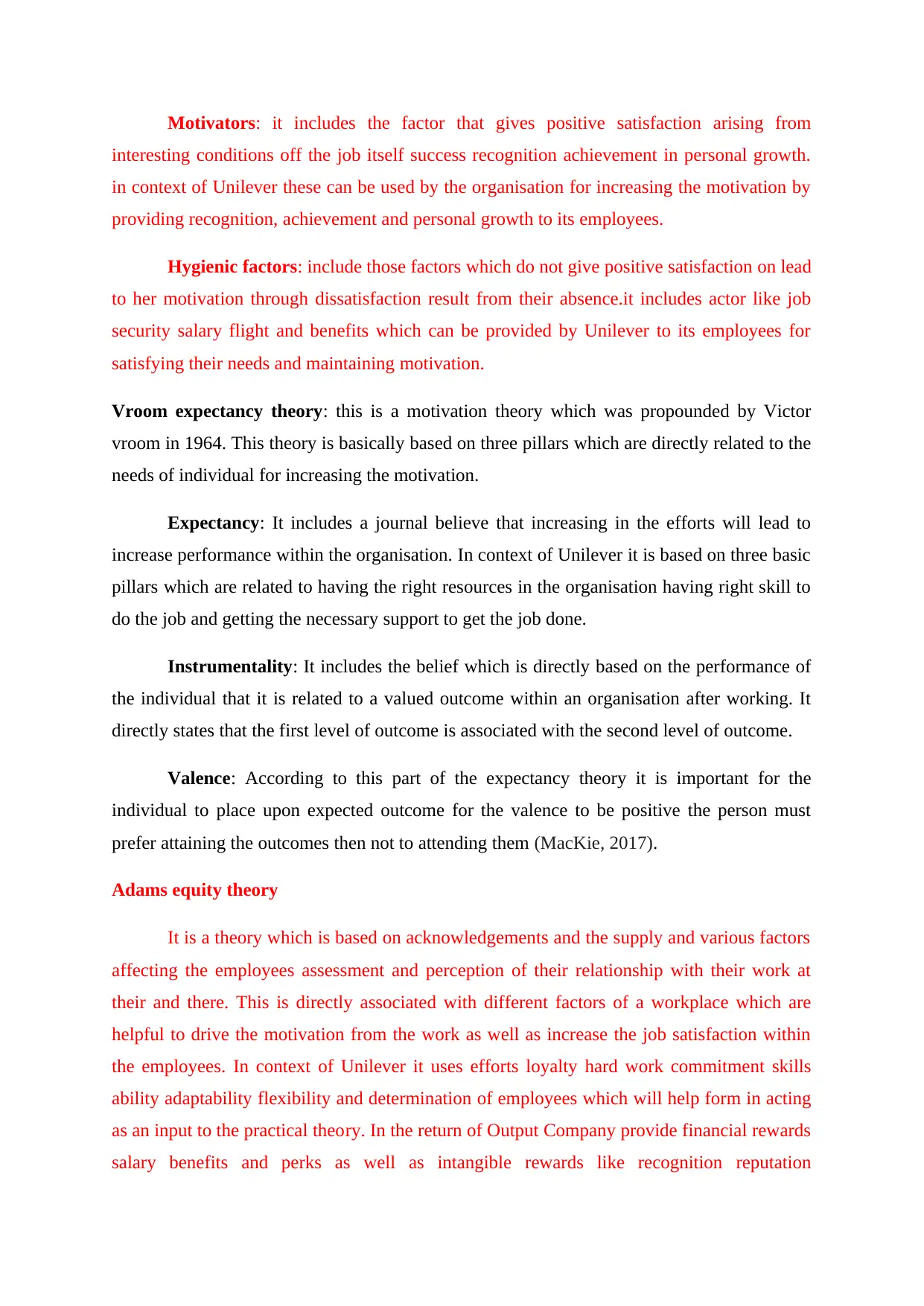
Motivators: it includes the factor that gives positive satisfaction arising from
interesting conditions off the job itself success recognition achievement in personal growth.
in context of Unilever these can be used by the organisation for increasing the motivation by
providing recognition, achievement and personal growth to its employees.
Hygienic factors: include those factors which do not give positive satisfaction on lead
to her motivation through dissatisfaction result from their absence.it includes actor like job
security salary flight and benefits which can be provided by Unilever to its employees for
satisfying their needs and maintaining motivation.
Vroom expectancy theory: this is a motivation theory which was propounded by Victor
vroom in 1964. This theory is basically based on three pillars which are directly related to the
needs of individual for increasing the motivation.
Expectancy: It includes a journal believe that increasing in the efforts will lead to
increase performance within the organisation. In context of Unilever it is based on three basic
pillars which are related to having the right resources in the organisation having right skill to
do the job and getting the necessary support to get the job done.
Instrumentality: It includes the belief which is directly based on the performance of
the individual that it is related to a valued outcome within an organisation after working. It
directly states that the first level of outcome is associated with the second level of outcome.
Valence: According to this part of the expectancy theory it is important for the
individual to place upon expected outcome for the valence to be positive the person must
prefer attaining the outcomes then not to attending them (MacKie, 2017).
Adams equity theory
It is a theory which is based on acknowledgements and the supply and various factors
affecting the employees assessment and perception of their relationship with their work at
their and there. This is directly associated with different factors of a workplace which are
helpful to drive the motivation from the work as well as increase the job satisfaction within
the employees. In context of Unilever it uses efforts loyalty hard work commitment skills
ability adaptability flexibility and determination of employees which will help form in acting
as an input to the practical theory. In the return of Output Company provide financial rewards
salary benefits and perks as well as intangible rewards like recognition reputation
interesting conditions off the job itself success recognition achievement in personal growth.
in context of Unilever these can be used by the organisation for increasing the motivation by
providing recognition, achievement and personal growth to its employees.
Hygienic factors: include those factors which do not give positive satisfaction on lead
to her motivation through dissatisfaction result from their absence.it includes actor like job
security salary flight and benefits which can be provided by Unilever to its employees for
satisfying their needs and maintaining motivation.
Vroom expectancy theory: this is a motivation theory which was propounded by Victor
vroom in 1964. This theory is basically based on three pillars which are directly related to the
needs of individual for increasing the motivation.
Expectancy: It includes a journal believe that increasing in the efforts will lead to
increase performance within the organisation. In context of Unilever it is based on three basic
pillars which are related to having the right resources in the organisation having right skill to
do the job and getting the necessary support to get the job done.
Instrumentality: It includes the belief which is directly based on the performance of
the individual that it is related to a valued outcome within an organisation after working. It
directly states that the first level of outcome is associated with the second level of outcome.
Valence: According to this part of the expectancy theory it is important for the
individual to place upon expected outcome for the valence to be positive the person must
prefer attaining the outcomes then not to attending them (MacKie, 2017).
Adams equity theory
It is a theory which is based on acknowledgements and the supply and various factors
affecting the employees assessment and perception of their relationship with their work at
their and there. This is directly associated with different factors of a workplace which are
helpful to drive the motivation from the work as well as increase the job satisfaction within
the employees. In context of Unilever it uses efforts loyalty hard work commitment skills
ability adaptability flexibility and determination of employees which will help form in acting
as an input to the practical theory. In the return of Output Company provide financial rewards
salary benefits and perks as well as intangible rewards like recognition reputation
⊘ This is a preview!⊘
Do you want full access?
Subscribe today to unlock all pages.

Trusted by 1+ million students worldwide
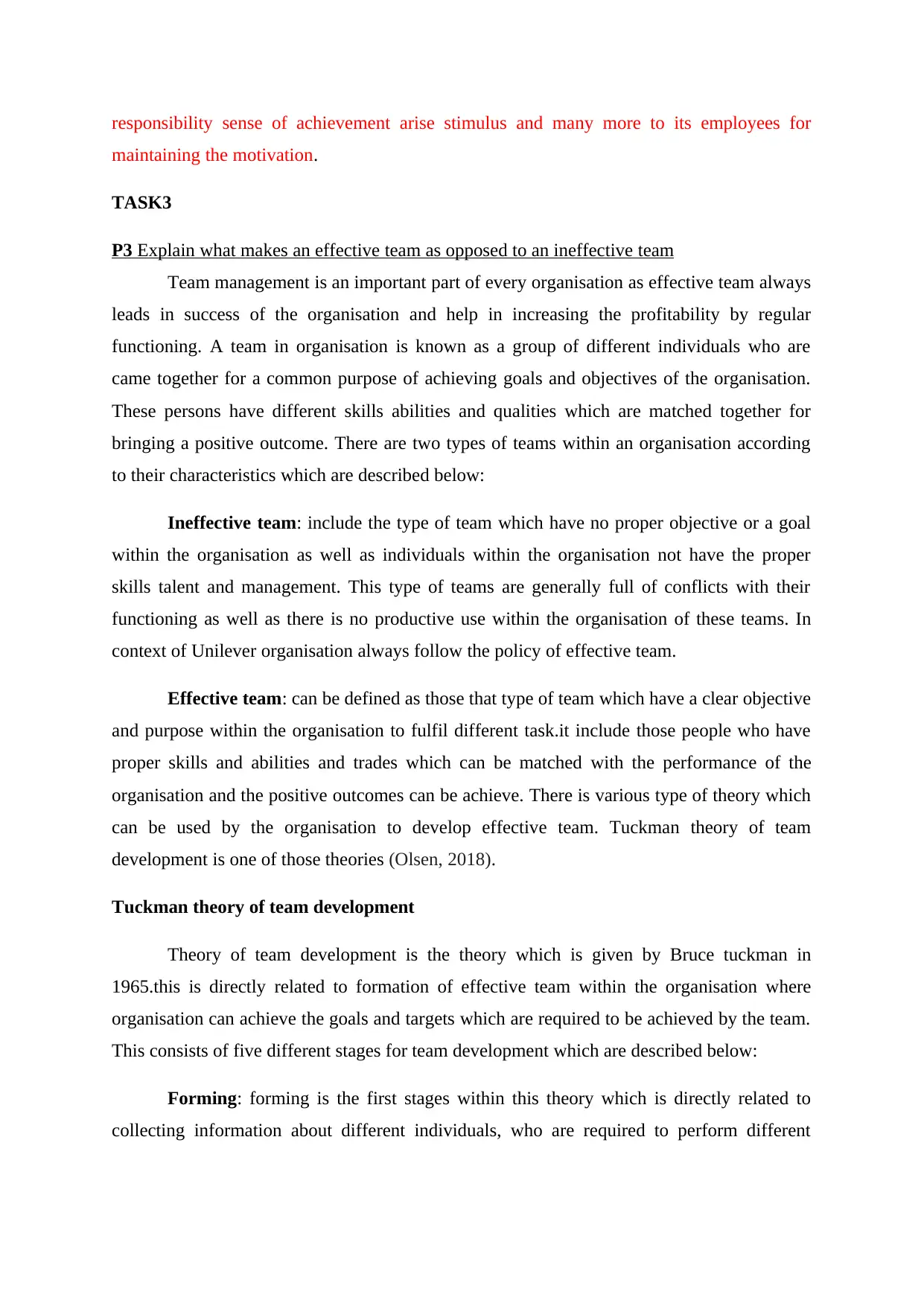
responsibility sense of achievement arise stimulus and many more to its employees for
maintaining the motivation.
TASK3
P3 Explain what makes an effective team as opposed to an ineffective team
Team management is an important part of every organisation as effective team always
leads in success of the organisation and help in increasing the profitability by regular
functioning. A team in organisation is known as a group of different individuals who are
came together for a common purpose of achieving goals and objectives of the organisation.
These persons have different skills abilities and qualities which are matched together for
bringing a positive outcome. There are two types of teams within an organisation according
to their characteristics which are described below:
Ineffective team: include the type of team which have no proper objective or a goal
within the organisation as well as individuals within the organisation not have the proper
skills talent and management. This type of teams are generally full of conflicts with their
functioning as well as there is no productive use within the organisation of these teams. In
context of Unilever organisation always follow the policy of effective team.
Effective team: can be defined as those that type of team which have a clear objective
and purpose within the organisation to fulfil different task.it include those people who have
proper skills and abilities and trades which can be matched with the performance of the
organisation and the positive outcomes can be achieve. There is various type of theory which
can be used by the organisation to develop effective team. Tuckman theory of team
development is one of those theories (Olsen, 2018).
Tuckman theory of team development
Theory of team development is the theory which is given by Bruce tuckman in
1965.this is directly related to formation of effective team within the organisation where
organisation can achieve the goals and targets which are required to be achieved by the team.
This consists of five different stages for team development which are described below:
Forming: forming is the first stages within this theory which is directly related to
collecting information about different individuals, who are required to perform different
maintaining the motivation.
TASK3
P3 Explain what makes an effective team as opposed to an ineffective team
Team management is an important part of every organisation as effective team always
leads in success of the organisation and help in increasing the profitability by regular
functioning. A team in organisation is known as a group of different individuals who are
came together for a common purpose of achieving goals and objectives of the organisation.
These persons have different skills abilities and qualities which are matched together for
bringing a positive outcome. There are two types of teams within an organisation according
to their characteristics which are described below:
Ineffective team: include the type of team which have no proper objective or a goal
within the organisation as well as individuals within the organisation not have the proper
skills talent and management. This type of teams are generally full of conflicts with their
functioning as well as there is no productive use within the organisation of these teams. In
context of Unilever organisation always follow the policy of effective team.
Effective team: can be defined as those that type of team which have a clear objective
and purpose within the organisation to fulfil different task.it include those people who have
proper skills and abilities and trades which can be matched with the performance of the
organisation and the positive outcomes can be achieve. There is various type of theory which
can be used by the organisation to develop effective team. Tuckman theory of team
development is one of those theories (Olsen, 2018).
Tuckman theory of team development
Theory of team development is the theory which is given by Bruce tuckman in
1965.this is directly related to formation of effective team within the organisation where
organisation can achieve the goals and targets which are required to be achieved by the team.
This consists of five different stages for team development which are described below:
Forming: forming is the first stages within this theory which is directly related to
collecting information about different individuals, who are required to perform different
Paraphrase This Document
Need a fresh take? Get an instant paraphrase of this document with our AI Paraphraser
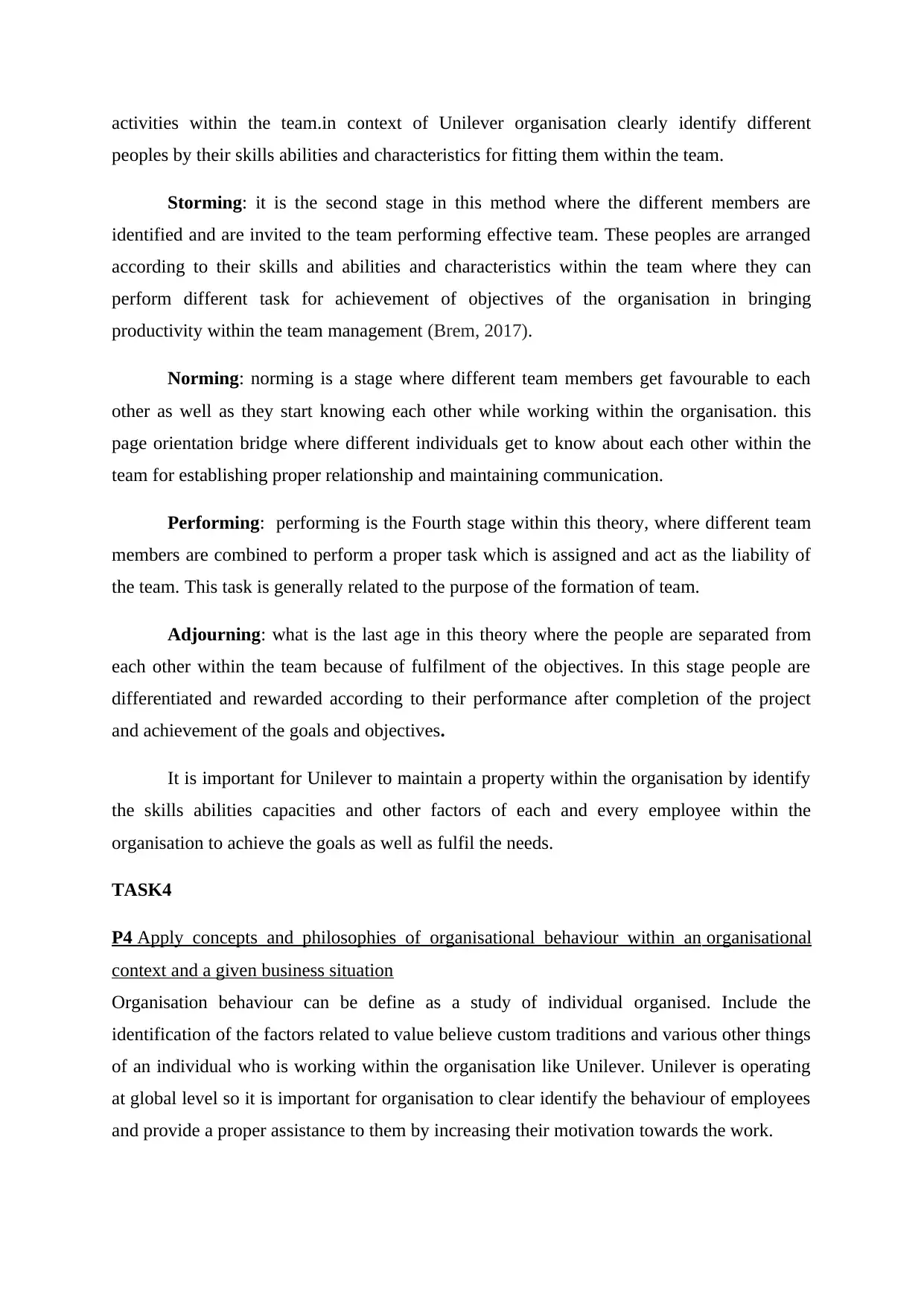
activities within the team.in context of Unilever organisation clearly identify different
peoples by their skills abilities and characteristics for fitting them within the team.
Storming: it is the second stage in this method where the different members are
identified and are invited to the team performing effective team. These peoples are arranged
according to their skills and abilities and characteristics within the team where they can
perform different task for achievement of objectives of the organisation in bringing
productivity within the team management (Brem, 2017).
Norming: norming is a stage where different team members get favourable to each
other as well as they start knowing each other while working within the organisation. this
page orientation bridge where different individuals get to know about each other within the
team for establishing proper relationship and maintaining communication.
Performing: performing is the Fourth stage within this theory, where different team
members are combined to perform a proper task which is assigned and act as the liability of
the team. This task is generally related to the purpose of the formation of team.
Adjourning: what is the last age in this theory where the people are separated from
each other within the team because of fulfilment of the objectives. In this stage people are
differentiated and rewarded according to their performance after completion of the project
and achievement of the goals and objectives.
It is important for Unilever to maintain a property within the organisation by identify
the skills abilities capacities and other factors of each and every employee within the
organisation to achieve the goals as well as fulfil the needs.
TASK4
P4 Apply concepts and philosophies of organisational behaviour within an organisational
context and a given business situation
Organisation behaviour can be define as a study of individual organised. Include the
identification of the factors related to value believe custom traditions and various other things
of an individual who is working within the organisation like Unilever. Unilever is operating
at global level so it is important for organisation to clear identify the behaviour of employees
and provide a proper assistance to them by increasing their motivation towards the work.
peoples by their skills abilities and characteristics for fitting them within the team.
Storming: it is the second stage in this method where the different members are
identified and are invited to the team performing effective team. These peoples are arranged
according to their skills and abilities and characteristics within the team where they can
perform different task for achievement of objectives of the organisation in bringing
productivity within the team management (Brem, 2017).
Norming: norming is a stage where different team members get favourable to each
other as well as they start knowing each other while working within the organisation. this
page orientation bridge where different individuals get to know about each other within the
team for establishing proper relationship and maintaining communication.
Performing: performing is the Fourth stage within this theory, where different team
members are combined to perform a proper task which is assigned and act as the liability of
the team. This task is generally related to the purpose of the formation of team.
Adjourning: what is the last age in this theory where the people are separated from
each other within the team because of fulfilment of the objectives. In this stage people are
differentiated and rewarded according to their performance after completion of the project
and achievement of the goals and objectives.
It is important for Unilever to maintain a property within the organisation by identify
the skills abilities capacities and other factors of each and every employee within the
organisation to achieve the goals as well as fulfil the needs.
TASK4
P4 Apply concepts and philosophies of organisational behaviour within an organisational
context and a given business situation
Organisation behaviour can be define as a study of individual organised. Include the
identification of the factors related to value believe custom traditions and various other things
of an individual who is working within the organisation like Unilever. Unilever is operating
at global level so it is important for organisation to clear identify the behaviour of employees
and provide a proper assistance to them by increasing their motivation towards the work.
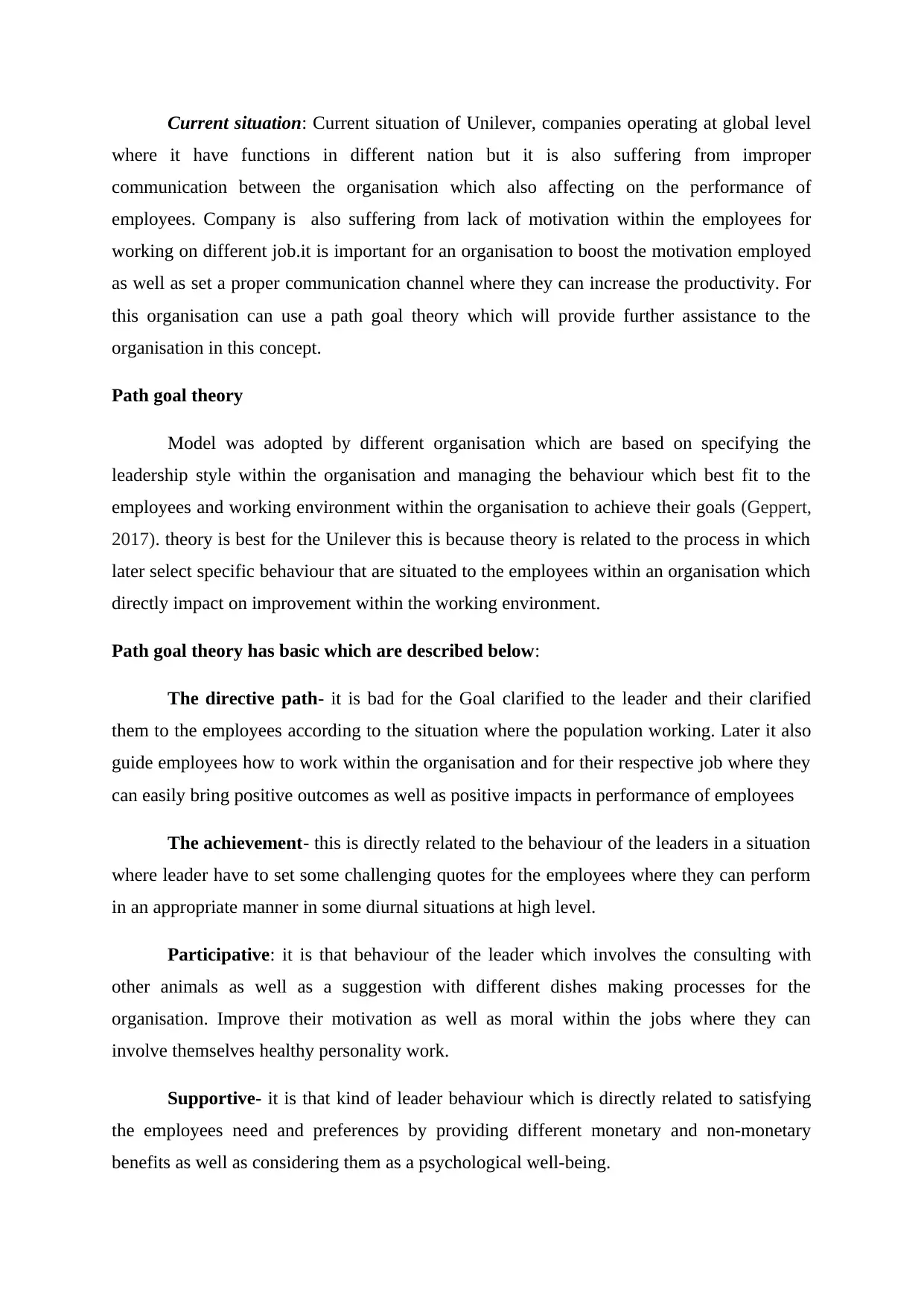
Current situation: Current situation of Unilever, companies operating at global level
where it have functions in different nation but it is also suffering from improper
communication between the organisation which also affecting on the performance of
employees. Company is also suffering from lack of motivation within the employees for
working on different job.it is important for an organisation to boost the motivation employed
as well as set a proper communication channel where they can increase the productivity. For
this organisation can use a path goal theory which will provide further assistance to the
organisation in this concept.
Path goal theory
Model was adopted by different organisation which are based on specifying the
leadership style within the organisation and managing the behaviour which best fit to the
employees and working environment within the organisation to achieve their goals (Geppert,
2017). theory is best for the Unilever this is because theory is related to the process in which
later select specific behaviour that are situated to the employees within an organisation which
directly impact on improvement within the working environment.
Path goal theory has basic which are described below:
The directive path- it is bad for the Goal clarified to the leader and their clarified
them to the employees according to the situation where the population working. Later it also
guide employees how to work within the organisation and for their respective job where they
can easily bring positive outcomes as well as positive impacts in performance of employees
The achievement- this is directly related to the behaviour of the leaders in a situation
where leader have to set some challenging quotes for the employees where they can perform
in an appropriate manner in some diurnal situations at high level.
Participative: it is that behaviour of the leader which involves the consulting with
other animals as well as a suggestion with different dishes making processes for the
organisation. Improve their motivation as well as moral within the jobs where they can
involve themselves healthy personality work.
Supportive- it is that kind of leader behaviour which is directly related to satisfying
the employees need and preferences by providing different monetary and non-monetary
benefits as well as considering them as a psychological well-being.
where it have functions in different nation but it is also suffering from improper
communication between the organisation which also affecting on the performance of
employees. Company is also suffering from lack of motivation within the employees for
working on different job.it is important for an organisation to boost the motivation employed
as well as set a proper communication channel where they can increase the productivity. For
this organisation can use a path goal theory which will provide further assistance to the
organisation in this concept.
Path goal theory
Model was adopted by different organisation which are based on specifying the
leadership style within the organisation and managing the behaviour which best fit to the
employees and working environment within the organisation to achieve their goals (Geppert,
2017). theory is best for the Unilever this is because theory is related to the process in which
later select specific behaviour that are situated to the employees within an organisation which
directly impact on improvement within the working environment.
Path goal theory has basic which are described below:
The directive path- it is bad for the Goal clarified to the leader and their clarified
them to the employees according to the situation where the population working. Later it also
guide employees how to work within the organisation and for their respective job where they
can easily bring positive outcomes as well as positive impacts in performance of employees
The achievement- this is directly related to the behaviour of the leaders in a situation
where leader have to set some challenging quotes for the employees where they can perform
in an appropriate manner in some diurnal situations at high level.
Participative: it is that behaviour of the leader which involves the consulting with
other animals as well as a suggestion with different dishes making processes for the
organisation. Improve their motivation as well as moral within the jobs where they can
involve themselves healthy personality work.
Supportive- it is that kind of leader behaviour which is directly related to satisfying
the employees need and preferences by providing different monetary and non-monetary
benefits as well as considering them as a psychological well-being.
⊘ This is a preview!⊘
Do you want full access?
Subscribe today to unlock all pages.

Trusted by 1+ million students worldwide
1 out of 14
Related Documents
Your All-in-One AI-Powered Toolkit for Academic Success.
+13062052269
info@desklib.com
Available 24*7 on WhatsApp / Email
![[object Object]](/_next/static/media/star-bottom.7253800d.svg)
Unlock your academic potential
Copyright © 2020–2025 A2Z Services. All Rights Reserved. Developed and managed by ZUCOL.




